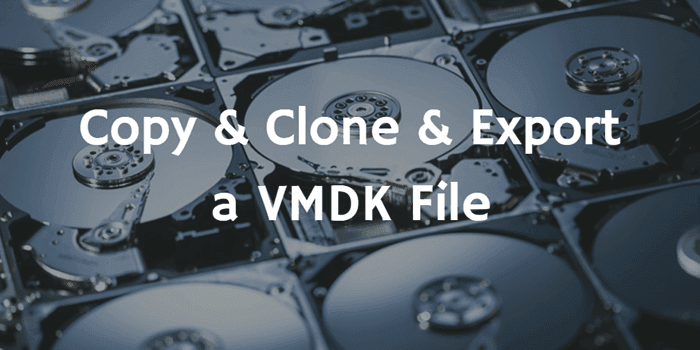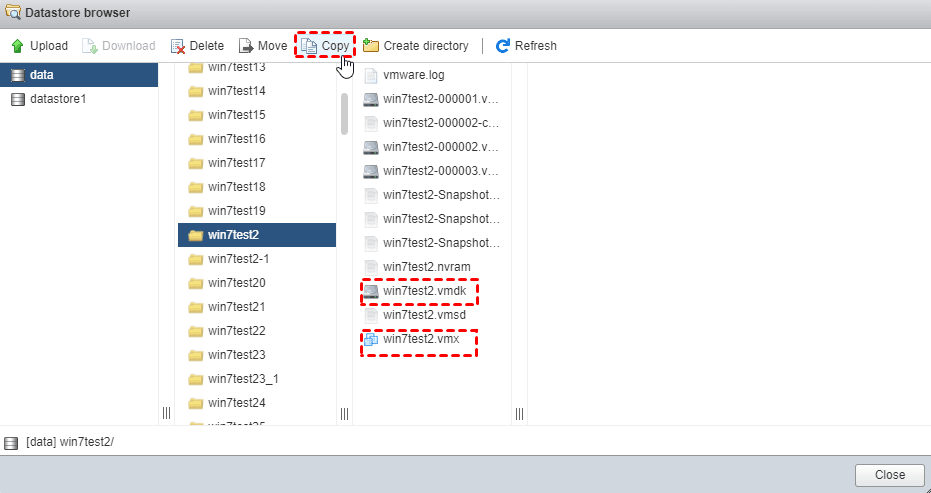In some cases, you need to upgrade or migrate your VMware virtual machines. What’s the efficient ways of copying a vmdk file from VMware? This article includes the common scenarios to do so.

VMDK is the disk format of VMware and VirtualBox virtual machines. In VMware ESX/ESXi hosts, VMDK files are stored under one of the /vmfs/volumes, perhaps on shared storage that include a virtual disk descriptor(diskname.vmdk) and virtual disk extent that contains raw data of the virtual disk(diskname-flat.vmdk). On Workstation, VMDK files are located in the same directory with virtual machine configuration (VMX) files.
In some cases, such as VM backup or migration, you need to copy VMware VMDK files. The question is, how to copy a VMDK file from VMware exactly?This article covers multiple methods to do so, for example, copy or migrate a VMDK file in VMware datastore, clone VMware virtual machine, export a VMDK file from ESXi.

The .vmdk file is stored in VMware ESXi datastore. Before you start copying VMware VMDK files, please check the following requirements.
1. Have sufficient space to store the VMDK files. If the disk space is not enough, the copy will fails.
2. Delete the all of the snapshots on this VMDK.
3. Power-off the virtual machine when copying VMDK files. If the VM is using the VMDK, you cannot copy a VMDK file from VMware ESXi VM.
4. Have permissions to access to the VMware VMDK files as administrator.
On VMware ESXi, copy a .vmdk file from VMware helps to create an identical virtual machine and protect data in case of failure. If you can access to vCenter, you can simply clone VMDK files, and for those who don’t use vCenter, you can copy the vmdk file from datastore.
1. Navigate to Datastore, click Datastore Browser to open the VMware datastore.
2. Locate a datastore in which you should create a target folder to store the copied VMDK file by clicking on Create directory.
3. Access to the source virtual machine folder, and select its .vmdk file. Click Copy button.

4. Select the newly created folder and click Copy the .vmdk file from this VMware VM to another datastore/VM.
If you want to migrate a VMware virtual machine to another datastore, you can select Move the VMDK file.
You can create an identical virtual machine using the copied .vmdk file in VMware datastore.
Virtual machine cloning is a feature exclusive to vCenter Server, and it will copy the entire VMware virtual machine including the .vmdk files.
1. Open vCenter, right-click the virtual machine and select Clone >> Clone to Virtual Machine.
2. In the opened wizard, specify a name and folder of a new virtual machine.
3. On Select a compute resource section, select a destination host for the new VM, click Next.
4. On Select storage section, choose Same format as source and Keep existing VM storage policies. Then specify a datastore for the cloned VMDK files.
5. On Select further clone option, select Power on virtual machine after creation. You can also choose to customize the operating system and VM’s hardware.
6. Review the settings and click Finish. Then you will get an identical virtual machine and VMDK file in VMware.
In order to copy a .vmdk file from VMware, you can efficiently export VM from ESXi. If you are famialr with using commands, you can also create a useful script to perform the procedures.
1. Navigate to Virtual Machines, right-click a VM and select Export to open the window.
2. Select the .vmdk file and .ovf file, then click OK.
3. Specify a location to store the exported files.
Now you've learned how to copy a vmdk file from VMware. In fact, you can also copy virtual machines via the way of backup & restore.
AOMEI Cyber Backup - a free VMware backup appliance is designed to copy VMware ESXi virtual machines. It has full compatibility that supports VMware ESXi 6.0-7.0 and Hyper-V of Windows Server 2012 and above. For multiple VM protection and migration, it owns a wide range of advantages as below.
Perpetual Free: no time limit for AOMEI Cyber Backup Free Edition. Support Free ESXi: Support both paid and free versions of VMware ESXi. Easy to use: With the intuitive interface, backup and restoration process are based on a few clicks. Agentless backup: Simply connect to VMware / Microsoft Hyper-V and create an agentless backup task from the central console. Automate multiple VM backup: Backup multiple VMware ESXi / Hyper-V virtual machines automatically with flexible backup strategies. Instant Disaster Recovery: instantly restore the whole virtual machine to the previous state from any selected history version. Lower cost and time: Automatic backup and centralized management for virtual machines, greatly reduce storage space and backup time.
Please hit the button below to download and use AOMEI Cyber Backup for free:
*You can choose to install this VM backup software on either Windows or Linux system.
1. Launch AOMEI Cyber Backup, navigate to Source Devices >> VMware >> + Add VMware Device, and enter the required information to Add vCenter or Standalone ESXi host.
2. Click Create New Task to schedule the VMware ESXi backups as the following:
3. Click Restore. It’s easy to restore a virtual machine to its previous status without any complicated reinstallation and configuration.
✍ While the Free Edition covers most of the VM backup needs, you can also upgrade to Premium Edition to enjoy: ✦ Batch VM Backup: Batch backup large numbers of VMs managed by vCenter Server or standalone ESXi hosts. ✦ Backup Cleanup: Configure retention policy to auto delete the old backup files and save storage space. ✦ Restore to new location: Easily make a clone of a virtual machine in the same or another datastore/host, without reinstalling or configuring a new VM.
With AOMEI Cyber Backup, you can copy multiple VMware virtual machines in a short time.
Whether you use vCenter or not, this article introduces how to copy a VMDK file from VMware ESXi. For example, you can copy VMware VMDK files manually, export the VMDK file, clone VMware virtual machine or try the backup software that helps in data protection and VM migration in VMware.
Virtual machine backup is necessary for business and do not use snapshot as one of the backup methods.